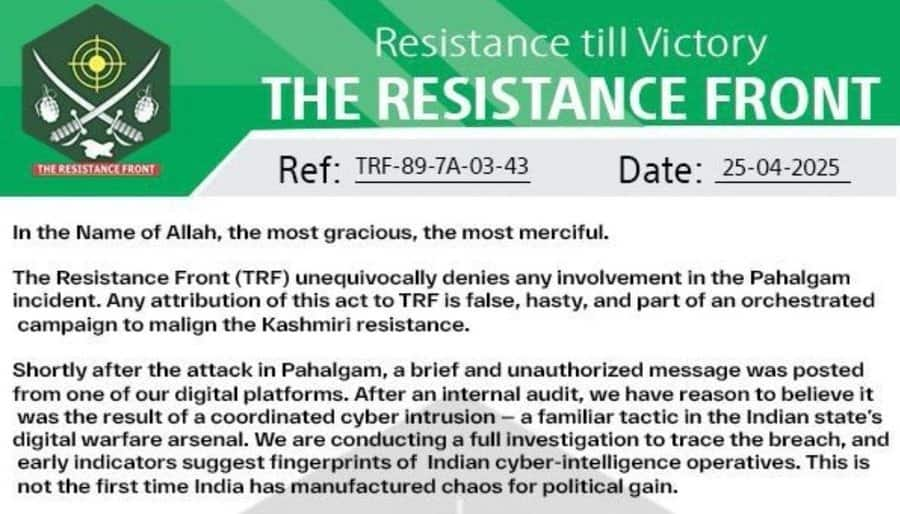In a dramatic turn, The Resistance Front (TRF)—a shadow arm of Pakistan-based terrorist organisation Lashkar-e-Taiba (LeT)—has denied its role in the deadly Pahalgam terror attack after initially claiming responsibility earlier this week.
The attack on April 22 in , Jammu and Kashmir, left and triggered widespread outrage across the Valley. Initially, a TRF statement had proudly taken credit for the bloodshed. However, under direct pressure from their handlers in Rawalpindi, TRF on Saturday disowned the attack, calling the earlier claim "unauthorised."
TRF said in a statement posted online that any attribution of the attack to them was “false” and “hasty.” They alleged that their digital channels had been compromised and blamed a “coordinated cyber intrusion” by what they called “Indian cyber-intelligence operatives.”
However, the claims point to a familiar pattern. This is not the first time Pakistan’s deep state has used such tactics. During the 2019 Pulwama terror attack, Pakistan similarly attempted to distance itself internationally while backing deadly operations on Indian soil.
Reports said Pakistan Army Chief General Asim Munir personally directed the Lashkar-e-Taiba leadership to ensure TRF withdrew its admission of guilt. The instruction reportedly came after international agencies began asking hard questions about Pakistan's role following the Pahalgam massacre.
TRF, which was officially designated a terrorist group under India’s Unlawful Activities (Prevention) Act in 2023, has long operated as a thin disguise for Lashkar-e-Taiba’s anti-India activities. Intelligence assessments show that TRF handles recruitment, infiltration, and logistics for terror missions—while LeT maintains plausible deniability to avoid global sanctions.
The so-called cyber breach excuse is a ploy to cover up Pakistan’s hand in the terror attack. There’s no doubt TRF initially owned the attack. Their sudden denial, blaming an imaginary hacking event, only exposes Pakistan’s desperation.
Several intelligence reports suggest that the Pahalgam attack was carried out by a group largely comprising foreign terrorists associated with LeT. These terrorists were reportedly aided by local militants and operated under the control of Hafiz Saeed, the mastermind of the 26/11 Mumbai attacks and the chief of Lashkar-e-Taiba.
Prime Minister Narendra Modi vowed that the killers and their backers would not be spared. "We will pursue them to the ends of the earth," he declared, promising to "identify, track and punish every terrorist and their supporters."
In response to the ghastly attack, India announced a series of tough diplomatic measures against Pakistan. These include suspending the SAARC Visa Exemption Scheme (SVES) for Pakistani nationals, expelling Pakistani military attachés, suspending the Indus Waters Treaty of 1960, and closing the Integrated Check Post (ICP) at Attari, Punjab, which is a key trading point between the two countries.
Pakistan reacted by shutting its airspace to Indian airlines and suspending trade ties with New Delhi. It also rejected India's move to suspend the Indus Waters Treaty, warning that any attempt to cut off water supplies meant for Pakistan would be treated as an "act of war."
The latest developments have once again brought global focus to Pakistan’s use of proxy groups like TRF to conduct terror operations in India while attempting to deflect international blame.
TRF was officially designated a terrorist organisation by India's Ministry of Home Affairs in January 2023 under the Unlawful Activities (Prevention) Act (UAPA). The group is known for promoting terrorism, recruiting militants, facilitating infiltration, and smuggling arms and narcotics from Pakistan into Jammu and Kashmir.
TRF was floated in 2019 soon after the Pulwama terror attack, mainly as an attempt by Pakistan's military establishment to rebrand Lashkar-e-Taiba’s operations under a new name. But the deep links between TRF and Lashkar-e-Taiba are well-documented and widely acknowledged by security experts.
Despite TRF's belated denial, the growing evidence points clearly towards Lashkar’s central role in planning and executing the Pahalgam massacre. The world, it seems, is no longer fooled by Pakistan’s old playbook of proxy terror and false denials.
Massive protests erupted in several parts of Kashmir after the Pahalgam attack, with ordinary Kashmiris condemning the killings. Many carried placards demanding an end to violence and accusing Pakistan-backed groups of destroying peace in the region.
The latest episode has once again drawn global attention to how Pakistan uses fronts like TRF to orchestrate terror in Kashmir while trying to shield itself from international pressure. But as history shows—from Pulwama to Pahalgam—such strategies are unlikely to fool the world anymore.
You may also like

West Bengal CM announces Rs 10 lakh compensation for families of Pahalgam terror attack victims

Screening for both active and dormant TB infection key to improve detection: Study

'Sucked marrow from bones of nation': When Khawaja Asif blasted Pakistan army

CHO Recruitment: Government job in health sector in Bihar! Apply to become CHO… 4500 posts will be recruited..

J-K: Tensions heighten along LoC in Poonch after Pahalgam terror attack, villagers clean underground bunkers







